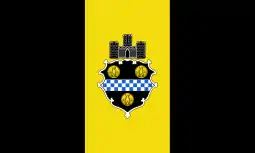St. Clair Incline
The St. Clair Incline, also known as the South Twenty-second Street Incline,[2] was built in 1886–1888 and operated by St. Clair Incline Plane Company.[3][4] It was a double track[4] incline on the South Side Slopes of Pittsburgh from Josephine St. to Salisbury St. The lower station was near the intersection of S. 22nd Street and Josephine. The upper station was on Salisbury Street across from the former Fort Laughlin site eventually occupied by Arlington Playground. The incline was 2,060 ft (628 m) long, with a vertical rise of 361 ft (110 m).[5] It was designed by engineer J. H. McRoberts.[5] As it carried both freight and passengers over steep tracks laid on the ground, it could be considered to be a cable railway. Its path was not of constant slope but became progressively steeper toward the top, tracing a parabolic arc.[5] It is uncertain exactly when the incline closed permanently, but it was reported as shut down in a 1932 Associated Press article about the "passing" of Pittsburgh's inclines.[6] The structure was dismantled in 1934.[7][8]
| St. Clair Incline | |
|---|---|
| Overview | |
| Locale | South Side Slopes, Pittsburgh, Pennsylvania |
| Coordinates | 40.4218°N 79.9746°W |
| Service | |
| Operator(s) | St. Clair Incline Plane Company |
| History | |
| Opened | March 5, 1888[1] |
| Dismantled | 1934 |
| Closed | c. 1932 |
| Technical | |
| Line length | 2060 ft (610 m) |
Fatal accidents
At 3:30 in the morning of April 6, 1909, an accident occurred when engineer Jesse Burton fainted against the controls, releasing the brake. As the upbound car reached the top, it slammed into the upper support, bounced away and rolled freely back down the grade. The impact had knocked both cables from their drums, so the car at the lower station did not provide a counterbalance on the move. The night turn had ended shortly before at D.O. Cunningham Glass on Jane St. near the lower station, and the upbound car was taking some passengers home. After the impact at the top, three young men jumped during their descent. One, Frank Bredl, 17, jumped early and survived. The others, Albert Klingenberger, 16, and Arthur Miller, 17, died from their injuries. A postcard of the era showed the aftermath of the accident.[9][10][11]
On July 22, 1915, a car ran over a 19-month-old baby who attempted to follow his two older sisters across the tracks.[12]
Another fatality occurred on March 10, 1919, when a gate on one of the moving cars swung open. A 17-year-old girl who had been leaning on the gate fell to the tracks and was run over by the car wheels.[13]
References
- "Two Railways". Pittsburgh Commercial Gazette. March 6, 1888. p. 2, col. 6.
- Fleming, George T., ed. (1916). Pittsburgh, How to See It. W.G. Johnston. pp. 70–71.
- Annual Report of the Secretary of Internal Affairs of the Commonwealth of Pennsylvania: Railroad, Canal, Navigation and Telegraph Companies. Part 4. 1889. p. 1324.
- Boucher, John Newton (1908). A Century and a Half of Pittsburg and Her People. Pittsburgh: Lewis Publishing Company. p. 339.
- "The Inclined Planes". The Street Railway Journal Souvenir: 40. October 1891.
- "Autos Spell Passing of Pittsburgh Inclines". Altoona Tribune. Associated Press. 15 March 1932. p. 1 – via Newspapers.com.

- "Rickety Steps Keep Residents out of Church". The Pittsburgh Press. 14 November 1934. p. 19.
- "Wrecking 22nd St. Incline". The Pittsburgh Press. 19 August 1934. Classified sec., p. 4.
- Hadley, S Trevor (1994). "Chapter 3: Inclined to Disaster (1909)". Only in Pittsburgh. educational publishing resources. pp. 19–22. ISBN 0-9642251-0-7.
- Potter, Chris (July 10, 2008). "Reign of Error". Pittsburgh City Paper. Retrieved 2009-05-14.
- "Inclined to Disaster". Pittsburgh Magazine. 36. June 1988.
- "South Side Baby Is Killed By St. Clair Incline Car". The Gazette Times. July 23, 1915. p. 14.
- "Girl Killed on St. Clair Car". The Gazette Times. Pittsburgh. March 11, 1919. p. 1.
